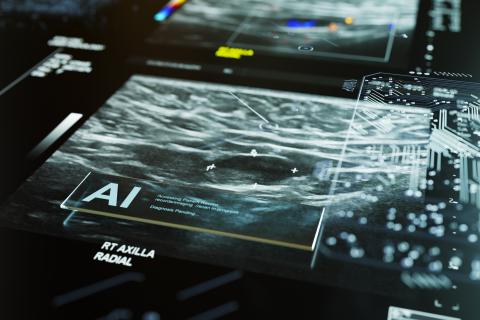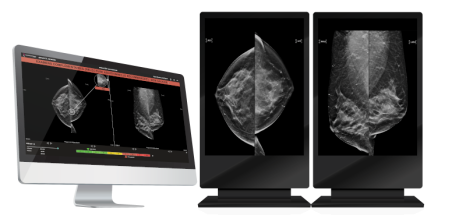
Therapixel: harnessing deep learning for breast cancer screening
As part of the National Breast Cancer Awareness Month in October, Pierre Fillard, co-founder and Chief Scientific Officer (CSO) of the start-up Therapixel presents this company, which emerged from research conducted at the Inria Saclay centre. Founded in 2013, Therapixel has become one of the leading software companies specialising in artificial intelligence (AI) applied to medical imaging. The company has developed a new algorithmic system to aid in breast cancer screening.
In recent years, the medical workforce in France has experienced a notable decline. Fewer individuals are pursuing medical careers, resulting in a shortage of healthcare professionals in several regions, particularly in radiology and medical imaging.
Simultaneously, the French population is ageing and at an increased risk of developing cancer, prompting the French Ministry of Health and Social Security to set up national screening programmes targeting three types of cancer - colorectal, breast and cervical. These screening programmes, fully funded after a certain age, rely heavily on imaging technologies. However, as the number of eligible patients continues to rise, so does the need in a medical sector already under strain.
Pierre Fillard
Faced with these two challenges, Pierre Fillard, a former Inria researcher at the Inria Saclay centre, and Olivier Clatz, previously a researcher at the Inria centre in Sophia Antipolis, turned to AI to develop solutions for cancer screening, particularly breast cancer. This led to the foundation of Therapixel, which specialises in applying AI to medical imaging. In this context, AI provides a second reading of the images, helping to speed up and improve the accuracy of diagnoses.
Enhancing the speed and accuracy of breast lesion detection
Today, Therapixel offers two AI-driven products, in particular using deep learning and neural networks. This form of AI teaches computers to process data in ways inspired by the human brain, enabling the precise analysis of high-resolution medical images (4000 x 3000 pixels) to detect breast lesions, regardless of their size.
These lesions include poorly-defined, small masses, often overlooked by specialists during mammograms, and clusters of microcalcifications, tiny groups of white pixels that are difficult to spot on such high-resolution images."Training the algorithm to identify these small features could potentially lead to earlier detection of a patient's breast cancer, which would completely change the approach,"notes Pierre Fillard.
Another interesting aspect of the technology is its ability to analyse and compare two images taken at different times."The aim is to identify temporal changes, distinguishing between stable and evolving features,"explains Therapixel's co-founder.
Radiologists can access the software via a cloud based Saas platform, i.e. online through a web browser. The start-up has also carried out extensive work to optimise the service and ensure a rapid screening process. Once the mammogram is complete, it is transmitted in real time to the algorithm, which returns an AI-generated report to the radiologist in under five minutes.
A pivotal moment
Therapixel's roots lie in the research conducted by Pierre Fillard and his former colleague Olivier Clatz at the NeuroSpin centre of CEA Paris-Saclay and later at Inria. Curious to explore innovations in the field of radiology and imaging, they embarked on an entrepreneurial journey in the early 2010s. “Publishing papers and developing new methods is fantastic, but we struggled to see how our work translated into tangible services,” explains Therapixel’s CSO.
Initially, the start-up aimed to give surgeons greater control over the medical images used during operating room procedures by using cameras with motion sensors to detect the surgeon's movements during the operation. This would allow them to control a screen displaying all the patient's medical images (MRIs, scans, etc.), so that they could consult the relevant image when in doubt. "It's a bit like in Stephen Spielberg's film Minority Report, where Tom Cruise uses a touchless interface. We made it a reality,"says Pierre Fillard with a smile.
In 2017, deep learning slowly began to gain traction. After winning a challenge related to breast cancer screening, the two researchers completely shifted away from their medical image control activity. This led to Therapixel becoming what it is today."We now process around a million mammograms a year in France, Europe and the United States,"states the entrepreneur.
A unique co-pilot
Although initially wary, radiologists have shown curiosity and openness toward Therapixel's technology."When deep learning first emerged, there were many claims, especially from some AI pioneers, that we no longer needed to train radiologists because AI would replace them. This was a profound misunderstanding of the radiologist's job and an overestimation of AI's capabilities. However, as radiology is a sector inclined towards innovation, professionals in this field are very curious when introduced to our product,"explains Pierre Fillard.
In France, an increasing number of radiologists, both in the private and public sectors, are adopting this type of service, which provides them with a considerable safety net through a second reading."It's a bit like getting on a plane: of course, the pilot is there, but statistically, it's safer to have a co-pilot. In fact, it's essential. The same principle applies to healthcare,"says Pierre Fillard. Using the technology it has developed, Therapixel detects an average of 50% of cancers a year earlier and can reduce false positives by 5 to 10%. "For patients, this decreases the likelihood of needing further tests and enduring months of anxiety waiting for results,"adds the start-up's CSO.
Towards predictive radiology?
In December 2024, Therapixel will be attending the Radiological Society of North America (RSNA) conference in Chicago, one of the largest international radiology conferences. The company will use this opportunity to unveil its new product: a more comprehensive solution for breast cancer screening."It will significantly speed up the radiologist's work,"reveals Pierre Fillard.
In terms of R&D, Therapixel's teams are also focusing on time sequence analysis, in other words, the technology's ability to take multiple images so as to reconstruct a history of events and predict future developments. The aim is to move towards predictive rather than reactive radiology.

